- Home
- Diana Killian
Docketful of Poesy Page 10
Docketful of Poesy Read online
Page 10
The door opened with another silvery swing of bells and Pammy poked her head inside requesting Tracy’s presence.
Tracy threw a long look at Peter who—utterly oblivious—was glancing over a list handed him by the young man. Reluctantly, she withdrew from the field of contest.
“Can we go outside and watch them film?” Cordelia inquired hopefully, and I nodded.
We followed Tracy down the winding flagstone path to the garden, and I introduced Cordelia to Roberta and Todd.
Roberta was distracted but gracious. Todd was personable. In fact, Todd was very personable—if not quite as avuncular as I’d have liked. I could see Cordelia’s dark eyes beginning to sparkle in that way that never boded well.
“Nah, RADA’s for snobs, innit?” he was saying as I stepped away to glance over the newly revised shooting script that Pammy had just thrust into my hands.
The shooting script is a detailed description of characters, locations, actions, sounds, camera angles. It’s everything from dialogue to the most elaborate technical points like camera heights and angles. The day’s shooting script lets the cast and crew know exactly what and who are needed during any given day’s work. In theory, anyway. The practical application seemed to be a little more…fluid.
I absently flipped through my copy. We were still mostly working from Walter’s script, as little as I liked it. The dialog, in particular, was squirm-making, but I was focusing my efforts on the later scenes. As I had received permission to scrap the original plan of sinking the Derwent steamer, I had to come up with a suitably thrilling, but more feasible, climax for the film. So far nothing brilliant had occurred.
When I noticed the two men in black ski masks advancing toward us from the woods behind Craddock House, my first reaction was exasperation. I began flipping through the script trying to see where they fit into the scene.
They didn’t.
They weren’t anywhere in the day’s shooting schedule. I glanced over at Roberta and Miles, who were in conference again. No one appeared ready to resume filming. Crew members were still adjusting lights and cameras and reflectors.
“Hey!” shouted Pammy, spotting the approaching men. “Hey, there!”
I turned back in time to see the two men come from behind the house. They raised shotguns and began to fire—at us.
I heard Pammy shriek. She threw herself flat on the grass.
I’m not sure how I managed to shake off that moment of paralyzed shock, but without thinking about it I ran forward, grabbed Cordelia, and yanked her down with me behind the boxwood hedge. Around us people were running for cover and screaming. Todd Downing had ducked down and was crawling swiftly along the shrubbery. It would have been funny if it hadn’t been so frightening.
I started to follow—and then a terrible thought occurred to me. I stayed put, heart hammering—and made Cordelia stay as well. She was shaking beneath the fierce grip I had on her arm, and swearing in a high breathless voice. I ignored her, watching Todd.
He slipped out from behind the banks of rosebushes and scurried, hunched over, across the lawn, making for the blue Mini parked beneath the trees across the road. The gunmen advanced down the hillside, pumping their guns and firing at the car.
I realized to my horror that they were closing in on him—that they must have thought he was Peter. And at that moment Peter landed in the grass next to me. He was holding a pistol—black, compact, deadly-looking—holding it with the assurance of someone who was used to handling guns. And that in itself was very hard to wrap my mind around.
“They’re going to kill him,” I told him. “Todd. They’re going after him.” I could hear the bewilderment in my voice as though I were listening to someone else—someone I heard from a distance.
Peter’s eyes met mine. Then he reached across, ruffled Cordelia’s hair, and said lightly, “Is it true about having more fun?”
She gulped. We both flinched at the repeated sound of shots.
To me, he said calmly, “Stay low. The garden gate is unlatched and the back door is open. Get her and yourself into the storeroom passage. Don’t come out until I tell you.”
“Wait. What are you planning to do?”
His smile was wry.
“Peter.” I grabbed his hand. “You’re not trained for this kind of thing —”
“I don’t think people train for this kind of thing.” He linked fingers with me quite casually and then released my hand. “I’ve rung the police, but they’ll likely be too late. Move.”
Cordelia was already crawling swiftly across the grass.
“She doesn’t know where she’s going,” he told me.
“Peter —”
“It’ll be all right.” And then he was moving along the edge of the shrubbery.
“Grace!” hissed Cordelia, looking over her shoulder.
I turned her way, turned back toward Peter, but he was gone. What choice was there? I began to crawl towards Cordelia.
And then it sounded like World War Three had started. Automatic weapons, bursts of gunfire, explosions…
I couldn’t help it. I had to see what the hell was going on. Cautiously, I poked my head up, then ducked back down at the thuds of feet in damp earth. The men with the shotguns sailed over the hedge—one of them landing a few feet from me. I froze but he never looked my way, taking off with his companion, racing for the back of the house, the lake and the woods beyond.
The firing and explosions died away, and I realized that the screams and yells of fright had turned into cheers and whoops. I stood and saw several members of the production team armed with enough guns and assorted weapons to run a small war.
Prop guns. Props. Make-believe.
Miles scrambled to his feet, snatched his cowboy hat off his head, and smacked it against his thigh, exclaiming, “Now that’s Hollywood!”
Chapter Ten
“No sign of ’em anywhere, sir,” a young uniformed constable reported to Brian. “We’ve got tire tracks in the woods that look promising. They might have parked there before walking across the meadow.”
“Thank you, MacMillan,” Brian answered. He turned to me. “Well, well. Your Mr. Fox has got up someone’s nose.”
I opened my mouth for an automatic, He’s not my Mr. Fox, but then I recalled that, oh yes, actually, he was. Instead, I said, “What a charming phrase. I’ll add that to my list of favorite Briticisms. It’s right up there with snogging.”
“You have a problem with snogging?” Brian inquired, interested.
Tearing my gaze from the emergency services van where the various minor injuries received by the cast and crew were being patched up, I answered, “Not with the act itself, just the term.” Snogging was British slang for kissing, and a more unromantic word for it I would personally be hard pressed to find. (Possibly suck face, but that’s almost too ghastly to contemplate.)
“You’re a fascinating woman, Miss Hollister,” Brian stated, although I suspected he meant “fascinating” in the way a scientist might observe insect colonies going about their business. I made a face at him.
“One thing’s clear,” Brian said. “If they’d wanted people dead, there would be people dead. They were firing shotguns, for godsake. It’s a miracle this garden isn’t awash with blood.”
Now there was a jolly thought. But Brian was right. It was obvious the men in black had interest in one target and one target alone. True, they had got the target wrong, but how were they to know Peter had a near-double on the premises?
The police had arrived at Craddock House shortly following the attack on the Kismet Production film crew, and several constables had set out eagerly across the fields searching for the gunmen—to no avail.
Chief Constable Heron was now in deep conversation with Peter; I could see from Peter’s expression that it was not an enjoyable encounter. And the Chief Constable didn’t look much happier. There were police and their vehicles everywhere; probably every law enforcement officer in the county—if not the neighboring
counties as well—was present. Nothing like this had ever happened in Innisdale. In fact, nothing like this had probably happened in the entire Lake District.
The police were methodically taking statements from the rattled cast and crew members. Granted, they weren’t as rattled as the natives would have been—Hollywood is a rough town—but a lot of flasks and a lot of Valium vials were unobtrusively making the rounds. I’d already given my version of events to Chief Constable Heron—and then again to Brian. Not that there was a lot to tell.
Brian said abruptly, yanking me back to awareness, “You do realize you might’ve been killed?” His eyes were slate gray, his face grim. There was no sign of my former agreeable escort.
“I realize, yes. So could have every person here. Including Peter.”
“Yes. Todd Downing for example.”
I nodded noncommittally. After hearing that Todd Downing had been targeted by the men in black, it hadn’t taken the police long to put two and two together—and their conclusion was not flattering to Peter. For the first time I got an inkling of why Peter had so little trust in the justice system. While no one actually came right out and said the attack on the production company was his fault, the implication was there.
“Fox knows these villains. And if he doesn’t know them, he surely knows why he’s on someone’s hit list.”
“I’m telling you he doesn’t. I know you think I’m blinded by some romantic fantasy, but if he knew, he’d…” I stopped at Brian’s expression. I finished mildly, “He’d go to the police.”
Brian snorted. “Right.”
Cordelia wobbled up in her high red boots. “I am so bloody late! Bri, can I go? Auntie is going to murder me!”
That was the beauty of being young. Cordelia was already over her fright and even sort of enjoying her recent brush with murder and mayhem.
Brian raised his eyes to heaven. “Go,” he said.
Cordelia turned to me, the heavily made-up eyes studying me hopefully. “I’ll see you tomorrow, Grace?”
“If you can’t think of anything better to do.”
She grinned, and departed on those ridiculous spiked heels. Brian stared disapprovingly after her coltish figure as she took the flagstone steps two at a time.
“She shouldn’t be hanging about here. Neither should you.”
“I agree with you about Cordelia, but the worst thing would be to deny her access. Don’t worry. Making movies is surprisingly dull. It’s mostly about standing around and waiting. I’m hoping she’ll soon get bored and find something else to amuse her.”
(True, my idea of a splendid time was poring over research materials or spending hours in a dusty archive somewhere….)
Brian turned away, spoke briefly to a constable, and then turned back to me.
I said, “Do you think it means anything that they used shotguns? I don’t really think of professional hit men using shotguns.”
“Do you think a lot about professional hit men?”
“More than I used to.”
His mouth quirked but he didn’t allow himself a smile.
I tried another angle. “Just a thought, but is it possible these goons might have thought the new MP Angela Hornsby was at Rogue’s Gallery?”
Brian stared at me. “An assassination attempt? Is that what you think?”
Not really, but I did wonder if the police were entertaining any theories beyond the idea that Peter had brought all this on himself. I replied, “I don’t know. You get these cranks sometimes who have different political views and take them out on public figures. Is Ms Hornsby very popular?”
“She’s not unpopular. Not that unpopular. You’ve been in the States too long. Besides, your theory wouldn’t explain why these same men tried to kill your Mr. Fox a week ago.”
“If they were the same men.”
“True,” Brian said equably. “He may have legions of people eager to kill him.”
“Funny.”
“Not really. Someone could have died here today. It’s a miracle no one was really hurt.” He was right. Apart from a few scrapes, sprains, and some minor injuries from shotgun pellets, Kismet Productions had escaped virtually unscathed.
“Yes, I know that, Brian.” I watched Peter turn away from Chief Constable Heron, and even at this distance I could see the lines of his face were tight with anger.
“Can we have dinner one night?” Brian asked suddenly, and I turned back to him.
“Well, the thing is —”
“Why should it matter? We’re friends, aren’t we?”
“Of course. But Peter and I are moving in together.”
“Are you?” he inquired blandly. “Because I’d heard you were staying at the Hound and Harrier with all the other celebrities.”
I overlooked the “celebrity” crack. “That’s because Peter doesn’t want me staying here until it’s…safe.”
“I’d like to think he had that much conscience—or common sense.” There was no smile on Brian’s face. “He’ll never do it, Grace. I don’t care what he tells you. Or even himself. He’ll never have you living here with him—let alone marry you. I know him. I know the breed.”
I reminded myself that Brian was a friend, and that he was saying these things because he truly cared for me. I said carefully, “I know you mean well, Brian, but in order for us to stay friends you’re going to have to accept the reality of my relationship with Peter.”
“I accept that you love him,” Brian said. “Would you like to have dinner one evening—merely as friends?”
I thought it over. Irritated at the moment though I was with Brian, I did like him, and —cynical as it sounds—he was the closest thing I had to a police contact, and I wanted to keep track of how the hunt for these gunmen progressed.
“May I call you?” I said. “I’m not sure of my schedule yet.”
He nodded, and then was called away by a couple of the crime scene technicians.
Miles was finishing up a short speech to cast and crew, trying to reassure everyone that there was no danger and that all was well under control. He made it convincing, but that was more due to the force of his personality than the logic of his argument. Although it was still early in the afternoon, he concluded briskly, “All right, people, I think that’s a wrap for today. Let’s head back to the hotel.”
“Drinks on me and Miles,” Roberta agreed, and there were a few halfhearted cheers.
The crew was still packing up as everyone else began piling into cars for the brief drive back to the village. I went inside Rogue’s Gallery. There was no sign of Peter. I went upstairs to his flat. Tapped on the door, which wasn’t quite shut.
“Come,” he called, and I pushed it open.
He was sitting on the sofa, graceful yet somehow wary, whisky glass in hand. He didn’t drink a lot of whisky, so perhaps that in itself meant something.
I sat down on the ottoman across from him. “I want to stay tonight,” I said.
He laughed. Shook his head, took a swallow of whisky.
“Look, I’m an adult. We’ve been through plenty of dangerous situations before. You say we’re going to make a go of it, but —”
“No.”
I stared at him. That flat single word was so unlike him.
I said, equally curt—and a lot chillier, “Really? Any particular reason?”
“Use your imagination.”
I studied him for a long moment. I wanted to give into the luxury of anger, and I probably would have if I hadn’t understood that he was pushing for that very thing. Nothing like a good old-fashioned lover’s quarrel to keep me at a safe distance.
“All right then,” I said finally. “I obviously can’t insist.” I stood up. “Oh, I almost forgot. Roberta wants to know if they can film inside Rogue’s Gallery.”
There was a long, speaking silence.
“That’s what I thought,” I said. “Well, I expect I’ll see you around.” I was nearly out the door before he spoke.
“Grace �
�”
Hand on the doorknob, I paused. He said, unusually awkward, “I’ll ring you.”
I said tartly, “I look forward to it.”
*****
“Thought I was a goner for half a mo,” Todd said cheerfully for the sixth or seventh time, and drained half his pint in a gulp.
We had gathered in the bar of the Hound and Harrier. The entire cast seemed to be crammed into the room, along with a number of locals who had heard the exciting news of the attack on the production company—and were now hearing each member of the cast relive where they had been at the moment the bullets started flying.
“They did seem to focus on you,” Mona said thoughtfully. The others examined him with interest.
“Reminded me of the good old days when I used to wager a few bob on the ponies,” Todd admitted, and everyone laughed. Shaken Todd might be, but I had to admit he was remarkably collected about his close call. “Thought for a moment or two I was done for,” he said yet again.
“You!” Pammy exclaimed. “I thought we were back in East L.A. for a minute!”
We were all getting a bit tipsy reliving our collective close call—there was nothing like shared danger to build a bond, though; and there was a real sense of camaraderie that evening. Or I’d had more to drink than I realized.
“All those yoga lessons finally paid off,” Roberta told Mona. “I’ve never seen anyone outside of a circus wrap themself into such a tiny ball.”
“I think I invented a new move,” Mona admitted. “The Praying Yank.”
This got another round of laughs, especially from the locals.
“Of course this is old hat to you,” Roberta said to me.
“Not really!”
And Mona said to Roberta, “Could someone shooting at you ever become old hat?”

 High Rhymes and Misdemeanors
High Rhymes and Misdemeanors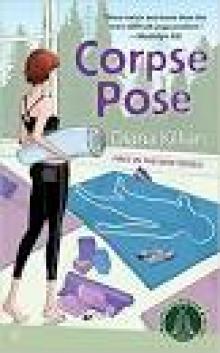 Corpse Pose
Corpse Pose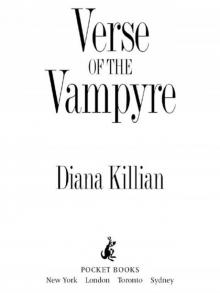 Verse of the Vampyre
Verse of the Vampyre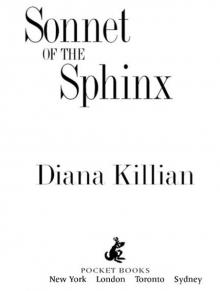 Sonnet of the Sphinx
Sonnet of the Sphinx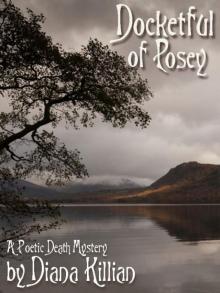 Docketful of Poesy
Docketful of Poesy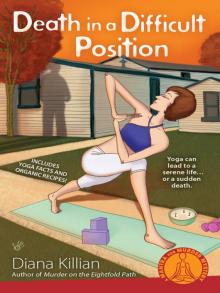 Death in a Difficult Position
Death in a Difficult Position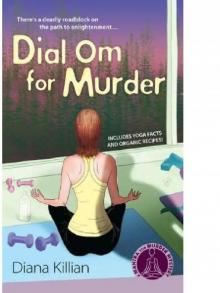 Dial Om for Murder
Dial Om for Murder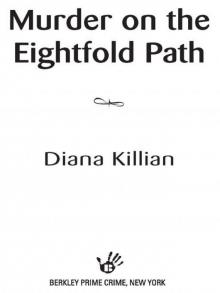 Murder on the Eightfold Path
Murder on the Eightfold Path